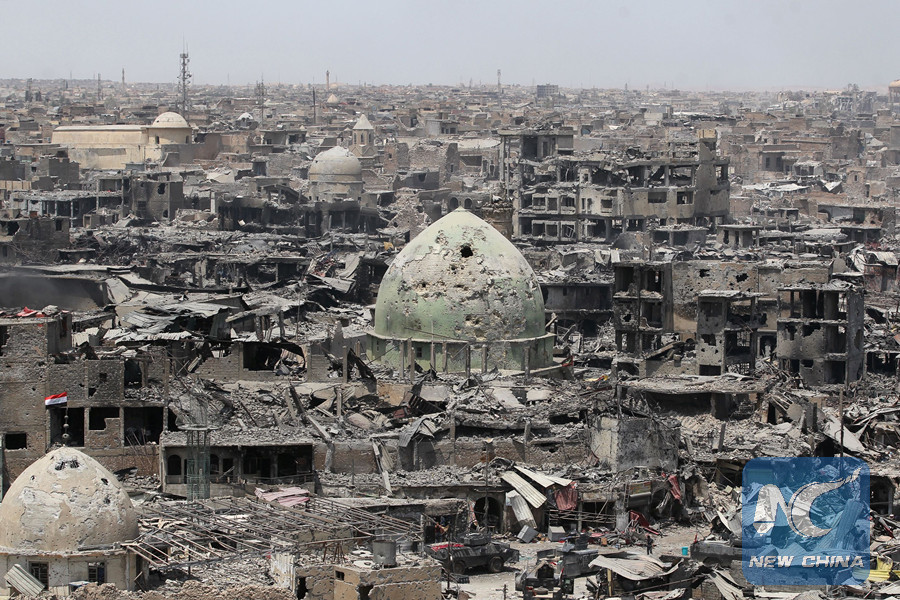
A picture taken on July 9, 2017, shows a general view of the destruction in Mosul's Old City. (AFP photo)
by Xinhua writer Zhi Linfei
CAIRO, July 10 (Xinhua) -- The liberation of Mosul from the Islamic State (IS) signals a defining milestone in Iraq's tough struggle to eliminate the terror group, but either for Iraq or the world, the anti-terror war is still far from victory.
The importance of retaking Mosul, the de facto IS capital in Iraq, by Iraqi government forces cannot be underestimated, as the city has been turned into a terror headquarters since IS leader Abu Bakr al-Baghdadi declared there the establishment of the Islamic caliphate three years ago. Mosul's fall symbolizes the start of a total collapse for IS in Iraq.
Since 2014, IS has spread like a cancer by sweeping through northern Iraq and Syria, where it took over large swaths of land. What shocked the whole world was the terror group's barbarity, cruelty and anti-human nature as illustrated by its horrific atrocities, such as beheading innocent civilians and journalists, destroying iconic historical relics, and enslaving women of other religions.
IS even bared its teeth outside the Middle East as a lethal terror force by launching a number of large-scale terror attacks in European capitals over the past years, in which hundreds of innocent people were killed and wounded.
However, while Iraq's hard-won victory is worth celebrating, the world must guard against euphoria as the anti-terror war is still facing grave challenges either in the Middle East or elsewhere.
First, IS is still holding Raqqa, its de facto capital in Syria and other territories including some remote areas in Iraq. It seems it will take longer time to liberate Raqqa due to the more complex situation in Syria, where various factions backed respectively by the U.S., Russia, Turkey and Syria, are fighting IS or among themselves.
Even after losing its control of Mosul and Raqqa, IS cannot be written off as a terror force. IS remnants could turn underground and bid their time to regroup or seek resurgence.
Second, the defeat on battlefields in the Middle East will motivate IS to launch a new wave of terror attacks to proclaim its continued existence. Western countries could be prime targets if IS seeks revenge for its humiliating defeat.
IS, at its peak time, once attracted a number of sympathizers from around the world to go the Middle East to fight shoulder by shoulder with its fighters. Now many of them have returned to their home countries, thus posing a major threat to security.
Third, and perhaps most importantly, the root causes of terrorism, which have generated terror groups such as al-Qaida and IS, still exist.
Besides lasting poverty, social inequality and religious rifts in some Middle Eastern countries, the U.S.-led Western countries have largely created the conditions for the rapid growth of terrorism in the region, by sowing seeds of conflicts via armed aggression, occupation and forced regime changes in the past decades.
Indeed, Western powers' interventionist policies have led to the worsening of poverty, political rivalries and religious conflicts in the Middle East, which was turned into a hotbed for terrorism.
For example, IS is in fact a by-product of the U.S. invasion of Iraq in 2003, which opened a Pandora box of chaos, hatred, conflicts and killings. During the war, tens of thousands of Iraqis were killed and many more others were forced to flee their homes. Many Iraqis became radicalized as they sought revenge in the name of religion.
History serves as the best teacher. The real lesson that the U.S.-led Western countries should learn from the tough war against IS and the heavy price being paid is that they must cast off their interventionist policies for good in order to uproot terrorism.
They also have to abandon their self-interested stance and double standard in their anti-terror policies. Too often they point the finger at other countries' crackdown on radical or terror groups in the disguise of seeking political and religious rights. This has hampered global counterterrorism cooperation.
As the war-torn countries in the Middle East, such as Iraq, are in dire need of reconstruction, it's imperative that Western powers fulfill their historical responsibilities.
The West should take the lead in extending much-needed aid to those countries, resettling hundreds of thousands of refugees displaced by war, and making genuine efforts to help achieve racial, religious and social reconciliation in the Middle East.
Needless to say, the threat of terrorism will not disappear by itself and peace will remain as elusive as ever in the Middle East, if the U.S.-led Western powers refuse to abandon their interventionist policies, speed up reconstruction aid and facilitate the reconciliation process, including restoring the Israeli-Palestinian peace talks through impartial mediation.

